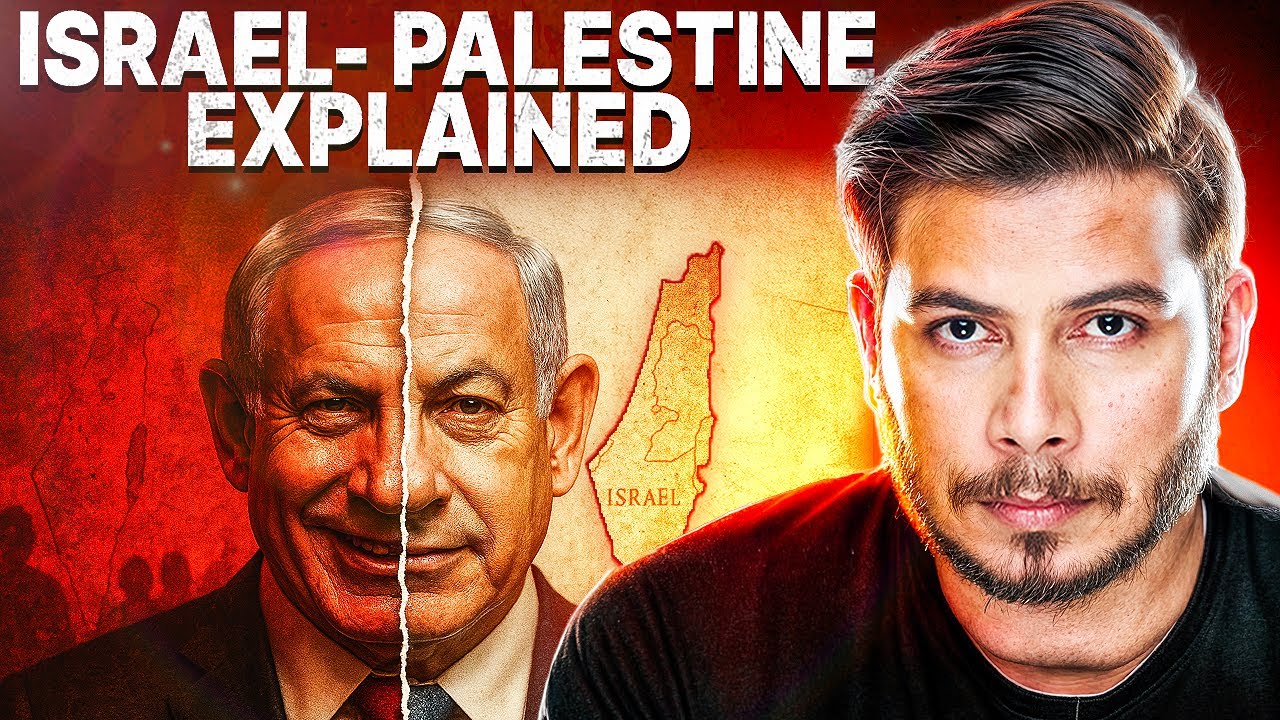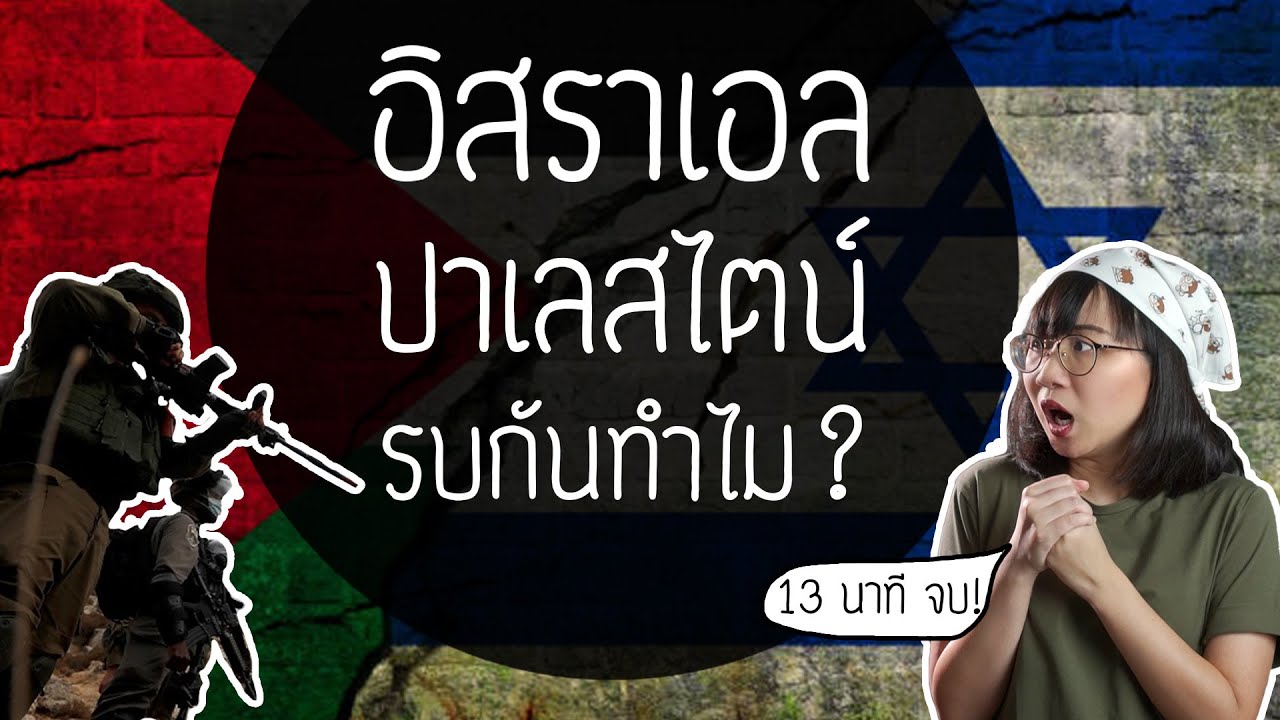History of Israel-Palestine Conflict
Summary
TLDRThis video script delves into the millennia-old Israel-Palestine conflict, tracing its roots from biblical times through Roman conquests, the Crusades, and the rise of Islam. It highlights key events like the Balfour Declaration, the 1948 Arab-Israeli War, and subsequent conflicts, including the Six-Day War and Intifadas. The narrative explores the struggle for Jerusalem, the impact of Zionism, and the ongoing tensions shaped by regional politics, culminating in recent hostilities and the precarious nature of peace in the region.
Takeaways
- 🕍 Israel is the world's only Jewish state located east of the Mediterranean Sea, with a long-standing conflict with Palestine over the territories of the West Bank and Gaza Strip.
- 🏛 The roots of the conflict date back thousands of years, with the region known as Canaan becoming known as the Land of Israel, and Jerusalem being a significant city for Judaism, Christianity, and Islam.
- 📜 The Roman Empire's conquest and renaming of the region to Palestine aimed to sever Jewish ties to the land, and this history of conquests led to a fluctuating Jewish population.
- 🕌 The 7th-century Arab conquest introduced Islam to the region, and the construction of the Dome of the Rock in Jerusalem further emphasized its significance to multiple religions.
- 🛡 The Crusades were a series of attempts by European Christians to reclaim Jerusalem, which also impacted the Jewish population.
- 🏳️ The rise of Zionism in the 19th and 20th centuries led to a movement of Jews returning to their ancient homeland, increasing tensions with the Arab population.
- 🏴 The British Mandate for Palestine after World War I included the Balfour Declaration, which promised a Jewish national homeland, further escalating tensions.
- 🗺️ The 1947 UN plan to partition Palestine into Jewish and Arab states was rejected by the Arabs and led to the 1948 Arab-Israeli War, resulting in significant Palestinian displacement.
- 🚨 The 1967 Six-Day War resulted in Israel gaining control over additional territories, including the West Bank, East Jerusalem, Gaza Strip, and the Golan Heights.
- 📜 The Oslo Accords in the 1990s attempted to establish a framework for Palestinian self-governance and peace, but conflicts over land and settlements continued.
- 💥 The Second Intifada in 2000 was sparked by disputes over Jerusalem, refugee rights, and settlements, leading to further violence and conflict.
- 🕋 The rise of Hamas and its conflict with Israel, including control over Gaza and various military operations, has added another layer to the ongoing tensions.
Q & A
What is the historical significance of the region now known as Israel and Palestine?
-The region, known as Canaan in ancient times and later as the Land of Israel, is significant as it is considered the 'Promised Land' in Judaism, Christianity, and Islam. It is where the Jewish patriarchs Abraham, Isaac, and Jacob settled, and where Jerusalem, a holy city to all three religions, is located.
Why was the region named Palestine by the Romans?
-The Romans named the region Palestine to break the Jewish connection with the land of Israel after they conquered the area. This was a strategic move to diminish Jewish identity with the land following the Jewish revolts against Roman rule.
What was the impact of the Crusades on the region of Israel and Palestine?
-The Crusades, launched by European Christians to reclaim Jerusalem, led to significant violence and upheaval in the region. Many Jews were killed during this period, and the control of Jerusalem changed hands multiple times between Christians and Muslims.
How did the rise of the Zionist movement in Europe influence the demographics of the region?
-The Zionist movement, which aimed to establish a Jewish national homeland in Palestine, led to a significant influx of Jews from Europe to the region, particularly in the early 20th century. This increased Jewish immigration contributed to tensions with the Arab population already living there.
What was the British Mandate for Palestine and what was its significance?
-The British Mandate for Palestine was a period of British administration of the region after World War I, during which Britain promised to establish a Jewish national homeland under the Balfour Declaration. This period was marked by escalating tensions between the Jewish and Arab populations.
What was the 1948 Arab-Israeli War and what were its consequences?
-The 1948 Arab-Israeli War, also known as the War of Independence, broke out after the declaration of the State of Israel. It involved Arab nations Egypt, Jordan, Iraq, Syria, and Lebanon. The war resulted in Israel gaining control over more territory, including West Jerusalem, and led to the displacement of over 750,000 Palestinians.
What is the significance of the Six-Day War in 1967?
-The Six-Day War was a brief conflict between Israel and neighboring Arab states. Israel emerged victorious, gaining control over the Golan Heights, the West Bank, East Jerusalem, Gaza Strip, and the Sinai Peninsula. This war significantly expanded Israel's territory and further complicated the Israel-Palestine conflict.
What were the Oslo Accords and what did they aim to achieve?
-The Oslo Accords were agreements signed between Israel and the PLO, aimed at establishing a framework for Palestinian self-governance in the West Bank and Gaza Strip. They were intended to be a step towards peace, but they also divided the West Bank into areas of varying control, which led to ongoing disputes.
What triggered the First Intifada and what were its outcomes?
-The First Intifada, a Palestinian uprising, was triggered by an incident where an Israeli truck collided with two Palestinian vans, killing four Palestinians. The conflict resulted in hundreds of deaths and eventually led to the signing of the Oslo Accords, initiating a peace process.
What is the role of Hamas in the Israel-Palestine conflict?
-Hamas, a Sunni Islamist militant group, has played a significant role in the conflict by opposing the existence of Israel and seeking to establish an Islamic state in its place. After gaining control in Gaza, it has engaged in several wars with Israel and has been involved in governance disputes with the Palestinian Authority.
What was the impact of the U.S. embassy relocation from Tel Aviv to Jerusalem in 2018?
-The relocation of the U.S. embassy to Jerusalem was seen by Palestinians as an endorsement of Israeli claims to the city as its capital, which they also claim as the capital of a future Palestinian state. This move was highly controversial and further complicated the peace process.
Outlines

This section is available to paid users only. Please upgrade to access this part.
Upgrade NowMindmap

This section is available to paid users only. Please upgrade to access this part.
Upgrade NowKeywords

This section is available to paid users only. Please upgrade to access this part.
Upgrade NowHighlights

This section is available to paid users only. Please upgrade to access this part.
Upgrade NowTranscripts

This section is available to paid users only. Please upgrade to access this part.
Upgrade NowBrowse More Related Video

Israel Palestine Conflict | Israel Palestine Issue Malayalam | Al Aqsa | Jerusalem | alexplain

Israel Palestine Conflict: 1000 year History | Jerusalem | Gaza | West Bank | Dhruv Rathee

Israeli–Palestinian Conflict

ISRAEL x PALESTINA: TUDO O QUE VOCÊ PRECISA SABER SOBRE O CONFLITO

ISRAEL e PALESTINA | Como Tudo Começou

อิสราเอล-ปาเลสไตน์ รบกันทำไม? | Point of View
5.0 / 5 (0 votes)